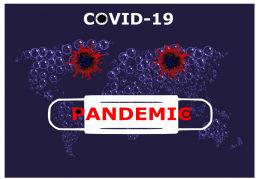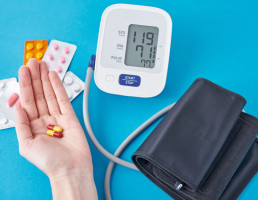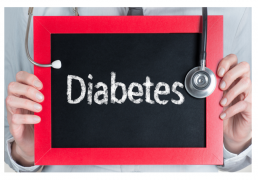What to Know About COVID-19
What is COVID-19?
COVID-19 is a disease that is transmitted by respiratory secretions. It is a novel, or new, strand of the coronavirus. COVID-19 is from the same family of MERS and SARS and thought to have originated as an animal coronavirus that infected people and then spread from people to people.
SARS-COV-2, which is a betacoronavirus, is the virus that causes COVID-19. COVID-19 is abbreviated for coronavirus disease 2019.
The disease classification has changed from an outbreak to epidemic to now a pandemic. The differences are how fast and quickly it can spread across a region. It is a world pandemic and as of today has spread to every continent except Antarctica. Because there is little to no immunity the virus is able to spread worldwide.
How is it transmitted?
COVID-19 is a respiratory infection that can be transmitted from respiratory droplets of infected people who cough or sneeze. Therefore, the CDC recommends people to stay at least 6 feet away from each other and not in direct contact. Some people may spread the virus prior to feeling symptoms. Additional ways of contracting the virus is from touching the surface or object that may have the virus and then touching your own mouth, nose or eyes.
Who is most at risk?
Since this virus is new, everyone is considered at risk. There are certain populations that are considered higher risk than others. This includes the elderly, infants, immunocompromised patients and anyone with an underlying condition, such as asthma or diabetes. This is a large population and it is important to be aware of the symptoms.
What are symptoms of COVID-19?
It may take days until symptoms do occur, anywhere from 2 to 14 days after exposure. Symptoms include a fever, dry cough, and itchy throat. Severe cases include difficulty breathing, requiring a respirator to help them breath. Call your doctor immediately if you think you have been exposed to COVID-19 and develop symptoms. The CDC states that emergency symptoms include: difficulty breathing or shortness of breath, persistent pain or pressure in the chest, new confusion or inability to arouse and bluish lips or face. Immediately seek medical help by calling your doctor if you think you have been exposed and are experiencing symptoms.
Concerns about blood pressure medications and COVID-19
COVID-19 binds to the receptor of angiotensin-converting enzyme 2 (ACE2). This receptor is found in various cells throughout the body including the lungs. It is an entry point for the virus and helps the virus gain access to the lungs. This particular receptor also plays a role in blood pressure in which many common blood pressure medications target.
A recent correspondence was published in Lancet by Lei Fang and others about COVID-19 and two classes of blood pressure medications, ACEIs (angiotensin-converting enzyme inhibitors) and ARBs (angiotensin receptor blockers). Based on the observation patients taking ACEIs and ARBs who have COVID-19 were at increased risk for adverse outcomes. The correspondence was based on 3 studies, with one of the studies involving 1099 patients with confirmed COVID-19 in China. The authors further suggested that patients should be switched from ACEI or ARB to a calcium channel blocker (CCB).
As of now there is no recommendation to stop using these agents. It is crucial to understand that not all patients can be switched to CCBs. This includes diabetes patients utilizing ACEI for kidney protection and congestive heart failure patients who may already be on a CCB and ACEI. If patients stop taking their ACE inhibitor or ARB it may actually worsen cardiovascular or kidney disease and lead to increased mortality.
It is urged that larger clinical trials need to be performed prior to altering life-saving medications within this population. Patients with underlying conditions such as cardiovascular or diabetes need to take precautions and quarantine to avoid others that are infected with COVID-19. Dr. Diaz, a professor at LSU Health New Orleans School of Public Health stated in an article in Science Daily, “Patients treated with ACEIs and ARBs for cardiovascular diseases should not stop taking their medicine, but should avoid crowds, mass events, ocean cruises, prolonged air travel, and all persons with respiratory illnesses during the current COVID-19 outbreak in order to reduce their risks of infection."
To note, there are two clinical trials set to be launched by the University of Minnesota that will study if losartan can prevent multi-organ failure in hospitalized patients with COVID-19 pneumonia and the second will evaluate if losartan can prevent COVID-19 hospitalizations. The thought is losartan is an angiotensin receptor blocker and this may block the entry-point for the COVID-19 virus. For more details about these clinical trials please log on to clinicaltrials.gov.
If you have concerns and are taking an ACE inhibitor or ARB speak to your doctor.
References:
- https://www.uptodate.com/contents/coronavirus-disease-2019-covid-19?source=history_widget#H2110619195. Accessed on March 28, 2020
- Receptor Recognition by the Novel Coronavirus from Wuhan: an Analysis Based on Decade-Long Structural Studies of SARS Coronavirus. Yushun Wan, Jian Shang, Rachel Graham, Ralph S. Baric, Fang Li. Journal of Virology Mar 2020, 94 (7) e00127-20; DOI: 10.1128/JVI.00127-20. Accessed on March 28, 2020
- Fang L, Karakiulakis G, Roth M. Are patients with hypertension and diabetes mellitus at increased risk for COVID-19 infection? Lancet Respir Med 6 2020; https://doi. org/10.1016/S2213-2600(20)30116-8. Accessed on March 28, 2020
- ACE inhibitors and angiotensin receptor blockers may increase the risk of severe COVID-19, paper suggests. https://www.sciencedaily.com/releases/2020/03/200323101354.htm. A possible explanation for the severe lung complications being seen in some people diagnosed with COVID-19 is proposed in a new article. Accessed on March 28, 2020
Diabetes AND COVID
Why are patients with diabetes considered more vulnerable to COVID-19?
The World Health Organization has categorized people with underlying conditions such as asthma, immunocompromised, and diabetes at greater risk for COVID-19.
Patients with asthma have a harder time of breathing when compared to someone who does not have asthma. Since COVID-19 is a virus transmitted thru respiratory secretions this puts patients with asthma in a high risk category. Immunocompromised patients have little to no immune system placing these patients at greater risk of infection including the COVID-19 virus. These reasons put these populations at larger risk for COVID-19.
But why are diabetes patients considered high risk for COVID-19?
There are two types of diabetes, Type I Diabetes and Type II Diabetes. Both involve a deficiency or absence of the body making insulin. In Type I Diabetes the body is making little to no insulin and patients must inject with the prescription insulin. In Type II Diabetes the body is not making enough insulin and are either adapting lifestyle changes, taking medications by mouth or injection and/or injecting insulin. When the body does not have enough insulin, the body’s sugars rise. This may increase inflammation within the body and resulting in an increased risk to infections.
According to the American Diabetes Association, people with diabetes face a problem of having worse outcomes with COVID-19 and NOT a greater chance of contracting the virus. This is based on the cases in China which people with diabetes who contracted COVID-19 had higher rates of serious complications and death as compared to people without diabetes. In addition, if someone had additional underlying conditions such as heart disease and diabetes, the risk of serious complications from COVID-19 increased. When a person with diabetes contracts an infection, this increases inflammation and put’s a person at greater risk for further complications.
Some TIPS…..
Ensuring your diabetes is under control is critical. Things that may help control your diabetes is taking your medications as prescribed, checking your blood sugars levels regularly, diet and exercise, and talking to your doctor to optimize your sugar blood levels. If you have not been adhering to your medications it is critical you do to help control your blood sugar levels. Talk to your doctor or pharmacist if you have any questions or need additional tips to help control your blood sugar levels. If you have diabetes and suspect that you have contracted COVID-19 immediately seek medical care.
References:
- World Health Organization. https://www.who.int/emergencies/diseases/novel-coronavirus-2019/advice-for-public/myth-busters. Accessed on March 22, 2020
- American Diabetes Association. https://www.diabetes.org/coronavirus-covid-19. Accessed on March 22, 2020
COVID Drug Trials
COVID-19 Promising Drug Treatment
Three promising drug treatments for COVID-19 include remdesivir, chloroquine and hydroxychloroquine. These are prescription medications and have other FDA approved indications, with the exception of remdesivir which is not FDA indicated for any indications (not yet on the market). These drugs are showing promise in trials and case studies but none have FDA approval. This may change with further studies. For now, speak to your doctor if you have concerns and want to know if any of these treatments are right for you.
Chloroquine AND Hydroxychloroquine
A little history…
In the 17th century the indigenous people of Peru extracted the bark of the Cinchona plant to fight chills and fever. In 1633 Europe then used it for similar reasons as well as to fight against malaria. In 1820 quinine an anti-malarial drug was extracted. This was widely used as anti-malarial drug until World War II, when similar derivatives were discovered with better safety tolerability. Chloroquine was discovered in 1934 by Hans Andersag and co-workers at the Bayer laboratory. Initially when discovered the drug was ignored due to human toxicity concern. It was not until 1947 the US government expanded clinical trials and brought it into clinical practice for prophylactic treatment of malaria. A derivative of chloroquine, named hydroxychloroquine, was later approved in the United States in 1955 to treat malaria.
Studies for COVID-19…
Chloroquine has shown in preliminary studies that it may be effective in treating COVID-19 associated pneumonia. A preliminary study suggests that chloroquine is effective and safe in COVID-19 pneumonia, helping to improve lung function and shortening the disease course. By delaying the need for a ventilator, it helps delay people from going into septic shock, giving the body more time to fight off the infection.
Additional studies have determined that hydroxychloroquine and chloroquine may both be effective in inhibiting COVID-19 in vitro (not yet in actual humans). A further study concluded that hydroxychloroquine was more effective with a better safety tolerability. In a recent published study hydroxychloroquine was shown to be less toxic than chloroquine and effective in inhibiting SARS-CoV-2 (COVID-19). This study was in vitro and therefore not in human patients but utilizing African green monkey kidney.
French researchers published a small study that involved 36-patients in which hydroxychloroquine was effective in killing the coronavirus. In addition, a subset of 6 patients tested negative for coronavirus when combined with the antibiotic azithromycin.
However, many experts warn against this combination. The combination of azithromycin and hydroxychloroquine may increase QT prolongation. An increase in QT prolongation is an abnormal heart rate. If a patient is at home and taking this combination this would be difficult to monitor, vs a patient in the hospital on a heart monitor being closely watched by a healthcare team. Therefore, experts have urged that more rigorous testing is needed for this combination and for hydroxychloroquine or chloroquine alone.
Chloroquine is indicated for treatment and prophylaxis of malaria and the treatment of amebiasis (an intestinal parasitic infection). Hydroxychloroquine is currently approved for malaria prevention and treatment, lupus (SLE), and rheumatoid arthritis. Anti-malarial drugs including chloroquine and hydroxychloroquine should be avoided in people with psoriasis as this can make psoriasis worst and cause outbreaks. Of these two medications hydroxychloroquine has the least side effects for people with psoriasis. Chloroquine has contraindications for people with heart disease or diabetes.
Remdesivir
Unlike hydroxychloroquine or chloroquine remdesivir is not FDA approved for any indication.
It is a broad-spectrum anti-viral medication that was developed by a company named Gilead for the treatment of Ebola, although it has not shown to be effective against Ebola. A study demonstrated some success in treating monkeys infected by the coronavirus MERS. It is now being tested to determine if this can be applied as treatment to COVID-19. In the United States, the first US patient confirmed to be infected with COVID-19 was treated with remdesivir and the patient did recover. Further studies are needed to determine its effectiveness for COVID-19 and scientists are working on this.
None of these drugs are approved or known to be treatments for COVID-19. This article is for informational purposes only. Treatment and prevention of COVID-19 should always be discussed with your provider.
References:
- Liu, J., Cao, R., Xu, M. et al.Hydroxychloroquine, a less toxic derivative of chloroquine, is effective in inhibiting SARS-CoV-2 infection in vitro. Cell Discov 6, 16 (2020). https://doi.org/10.1038/s41421-020-0156-0
- Wang M, Cao R, Zhang L, et al. Remdesivir and chloroquine effectively inhibit the recently emerged novel coronavirus (2019-nCoV) in vitro. Cell Res. 2020;30(3):269–271. doi:10.1038/s41422-020-0282-0
- https://www.cdc.gov/malaria/resources/pdf/fsp/drugs/Chloroquine.pdf. Accessed on March 21, 2020
- https://www.psoriasis.org/about-psoriasis/causes. Accessed on March 21, 2020
- https://www.ncbi.nlm.nih.gov/pubmed/19836374 Access on March 21, 2020
- https://www.pdr.net/drug-summary/Chloroquine-Phosphate-chloroquine-phosphate-3418. Accessed on March 21, 2020
- https://www.gilead.com/purpose/advancing-global-health/covid-19. Accessed on March 21, 2020
- https://www.scmp.com/news/world/united-states-canada/article/3050949/us-coronavirus-patient-who-was-worlds-first-treated. Access on March 21, 2020



